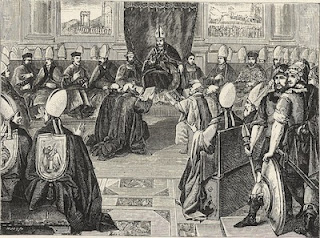Robert was described by 12th century historian Robert de Torigni as Flemish, but another contemporary cleric and biographer, William of Wycombe, says he and Bethune grew up in neighboring villages in Buckinghamshire. Bethune started as a teacher before going to study theology under Anselm of Laon. He became a canon and then prior of Llanthony Priory.
In 1130, he was made Bishop of Hereford (pictured is Hereford Cathedral) by King Henry I. Henry supposedly claimed that he needed at least one "godly bishop" around. Keep in mind that many high-ranking religious positions were given as rewards, not necessarily because the recipient deserved them because of his piety. Bethune must have had a reputation for holiness.
To understand what comes next, you need to know about the White Ship incident in late November 1120. The White Ship sank off the coast of Normandy. All aboard died, including Henry's sons. Stephen of Blois was supposed to be on it, but stayed back due to illness. Henry himself was on another ship. The result was that all male heirs to the throne were gone. Henry's second marriage to Adeliza of Louvain was not likely to produce another male heir.
When Henry died, Stephen of Blois seized the throne before Henry's only remaining potential heir, his daughter Matilda, could claim it. Matilda was married to Holy Roman Emperor Henry V, and therefore an empress, and she was not going to let this slide. Her rightful opposition to Stephen led to a period of conflict between the two called The Anarchy.
But back to Robert de Bethune: he supported Stephen's actions from the start. His loyalty to Stephen and his reputation for piety made Stephen trust him. King Stephen (like other kings of England) did not like the papacy's authority over England. England had its own chief prelate, the Archbishop of Canterbury, and the conflicts between kings and archbishops were numerous. But Stephen trusted Bethune to stay loyal to him; he might have had Bethune in mind as archbishop some day.
Unfortunately, Stephen could not rely on Bethune's loyalty after the Council of Reims in 1148. Bethune became ill on the third day and died a few weeks later. William of Wycombe's account of his life was an attempt to get him canonized as a saint, but it did not accomplish that result.
Robert de Torigni, who claimed Bethune was Flemish (and may have been right; Bethune's family could easily have come from Flanders and settled in Buckinghamshire), was a Norman monk who wrote about English matters. Let's take a closer look at his life and works...next time.

